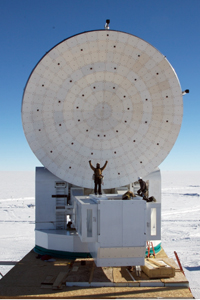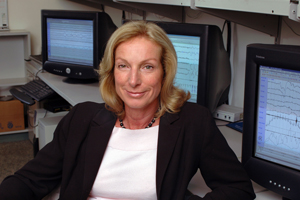Chicago in the News
The Chronicle’s biweekly column Chicago In the News offers a digest of commentary and quotations by a few of the University faculty members, students and alumni who have been headlining the news in recent weeks. Chicago faculty members are some of the most frequently quoted experts, so space allows publishing references to only selected examples. To read many of the full newspaper articles mentioned in this column, visit the In the News column at the University News Office Web site: http://www-news.uchicago.edu.
 | |
Tug-of-war across universe
A number of University astrophysicists were interviewed for a large spread that was published in the Monday, Dec. 31 Chicago Tribune, including John Carlstrom, the Subrahmanyan Chandrasekhar Distinguished Service Professor in Astronomy & Astrophysics and Physics, and the College. Carlstrom leads a team of scientists at the South Pole in the search for evidence to help explain and better understand dark energy, a mysterious force in the universe. Edward “Rocky” Kolb, the Arthur Holly Compton Distinguished Service Professor in Astronomy & Astrophysics and the College, Steve Padin, Senior Scientist in Astronomy & Astrophysics, and students in Physics also were quoted. “It’s not incorrect to think of dark energy as acting like negative gravity,” said Carlstrom. “We’re looking at a tug-of-war with dark energy and gravity trying to expand or collapse the universe.” Carlstrom heads the international team that designed and constructed the South Pole Telescope, which was shipped to Antarctica in pieces before its final assembly. “It gets really, really cold, because you aren’t moving much. There’s steel behind you, steel in front of you and you’re holding steel tools,” said Joaquin Vieira, a graduate student in Physics who helped assemble the telescope at the South Pole. Kolb, who recently chaired the Dark Energy Task Force formed by the U.S. Department of Energy, NASA and the NSF, predicts that future dark-energy research will likely require bigger and more powerful telescopes, perhaps those based in space. “We in astronomy think dark energy is a billion-dollar question. We feel it is that fundamental. It is a big question that will require a big effort to answer it.” Carlstrom noted that the search for answers about dark energy is one of the great quests of human inquiry. “I think it’s absolutely amazing that we’re out looking at origins of the universe, and we are discovering new laws of physics as we go. Who knows what you will find when you discover new laws of physics? There are a lot of bright people who will see applications in it, and who knows what they will come up with?”
 Eve Van Cauter | |
Got slow-wave sleep?
Eve Van Cauter, Professor in Medicine, and Esra Tasali, Assistant Professor in Medicine, were interviewed for articles about their study on a new risk factor for diabetes. While previous research has shown that quantity of sleep affects health, the current study shows that quality of sleep affects blood-sugar levels that can put people at a higher risk for diabetes. Van Cauter and Tasali found that disrupting the study volunteers’ deepest sleep periods rapidly resulted in a reduction in their ability to regulate blood-sugar levels. “This decrease in slow-wave sleep resembles the changes in sleep patterns caused by 40 years of aging,” said Tasali in an Associated Press story. Van Cauter said: “Since reduced amounts of deep sleep are typical of aging and of common obesity-related sleep disorders, such as obstructive sleep apnea, these results suggest that strategies to improve sleep quality, as well as quantity, may help to prevent or delay the onset of type 2 diabetes in populations at risk.”
Unthinkable marriage ends tragically
Richard Shweder, the William Claude Reavis Distinguished Service Professor in Comparative Human Development, Psychology and the College, was quoted in an Associated Press story that reported on the recent apartment fire in Oak Forest, Ill. that killed a young family. Allegedly, Subhash Chander, an immigrant from India, believed his pregnant daughter had married below her social station and set the blaze that killed her, his son-in-law and the couple’s 3-year-old son. In India, the ancient Hindu caste system—though outlawed for decades—is still followed by many people, noted Shweder. A cultural anthropologist who has studied culture in India, Shweder said that some families there would consider the marriage of Chander’s daughter to his son-in-law unthinkable and upsetting. “There’s a deep sense of ancestral history. So the ancestors of the family are very much on the mind of the people and what they would think. To go to that other kinship group without being invited is itself a kind of breach, and the father would think he was behaving in a way that was kind of humiliating. It’s not hard to see how he would just lose it,” explained Shweder.
Our ‘Daily Me’
Cass Sunstein’s latest book, Republic.com 2.0, was featured in an article that appeared in the Chicago Tribune Sunday, Dec. 30. Sunstein, the Karl N. Llewellyn Distinguished Service Professor in the Law School, Political Science and the College, has studied how the Internet provides Americans with the ability to choose precisely the political and cultural information they want to consume and that which they want to avoid—an increasingly popular practice that Sunstein argues is harmful to democracy. According to the article, Sunstein argues that Americans are losing crucial civic virtues, such as self-criticism, civility and open-mindedness. The Tribune author wrote: “Sunstein asks, what is the benefit of the Internet’s unlimited choices if citizens narrowly limit the information they receive, creating smaller niches and fragmenting the shared public conversation on which democracy depends?” Newsweek magazine also noted Sunstein’s book in an article that argues that a divide is widening between political news junkies and everyone else who is tuning out. That article appeared in the Monday, Dec. 31 edition of the periodical.
Getting grounded for Cerenkov
Scott Wakely, Assistant Professor in Physics and the College, was interviewed for a Space.com article about his research on cosmic rays. “Cosmic rays are not a spectator phenomenon in the galaxy—they have a role in galactic dynamics. To understand the galaxy in a full sense, you need to understand cosmic rays,” said Wakely. When cosmic rays smash into the upper atmosphere and release energy, they create a blue flash known as Cerenkov radiation, a phenomenon that space-based instruments detect with high precision. When cosmic ray particles break into a shower of smaller pieces, they produce a second blue flash, which ground-based instruments are able to detect. Wakely and Simon Swordy, the James Franck Professor in Physics and the College, are designing a ground-based instrument that could detect both the first blue flashes of Cerenkov radiation and second blue flashes, allowing them to study larger areas, as the space-based instruments are limited in their scope of detection. Detecting both flashes would allow scientists to determine the elements of particles and their origin. “We can say that was iron or that was uranium. Those are the kind of data you need to make progress in this business. The goal of this instrument is to combine large-area detection with the high precision of space-based sensors.” The blog Wired Science also reported news of the new cosmic ray ground-based instrument.
A limited incentive
According to new research by John List, Professor in Economics and the College, and his Yale University colleague Dean Karlan, matching gifts provide incentive for contributors to give to charitable causes, but the ratio of the matching gift has little influence on the amount donors contribute. An article about this research was published in the Thursday, Dec. 20 Chicago Tribune.
Name that dinosaur
Nathan Smith, a graduate student in Evolutionary Biology, was interviewed for a story that was published in the Chicago Sun-Times on Wednesday, Dec. 12. The story reported the fossil discovery of a plant-eating sauropodmorph found on Mt. Kirkpatrick in Antarctica. Smith, who did the academic research on the specimen with paleontologist Diego Pol of Argentina, accompanied his former professor William Hammer of Augustana College on the digs near the South Pole. Smith named the dinosaur Glacialisaurus hammeri, after Hammer.
![[Chronicle]](/images/sidebar_header_oct06.gif)